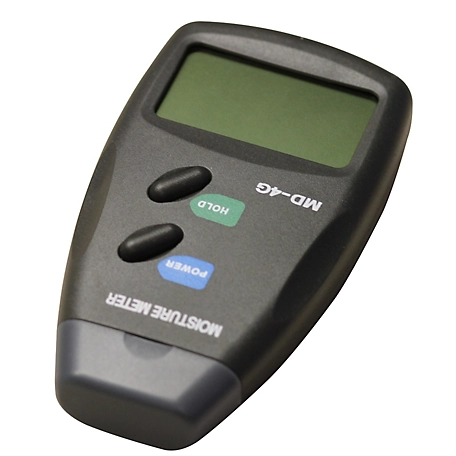The Ultimate Guide to Moisture Meters: A Comprehensive Overview and Exactly How They Can Save You Money
In the realm of structure upkeep, construction, and different sectors, the importance of precisely determining wetness levels can not be overemphasized. Dampness meters act as indispensable tools in identifying and checking moisture material in products, helping in protecting against costly problems and making certain the top quality of items. Recognizing the nuances of various kinds of wetness meters, their applications, and the potential cost-saving advantages they provide can be a game-changer for businesses and specialists alike. Uncovering how these tools can not only streamline procedures but additionally add to economic savings is a trip worth beginning on.
Sorts Of Moisture Meters
One usual type is the pin-type wetness meter, which measures the electric resistance in between two pins placed right into a product. Pinless dampness meters, on the other hand, usage electro-magnetic sensing unit plates to scan a larger area without triggering damages to the product's surface.
Moreover, there are additionally specialized wetness meters made for specific materials like grain, hay, or dirt. These meters give accurate moisture readings tailored to the distinct residential or commercial properties of the material being evaluated. Infrared wetness meters measure the thermal residential or commercial properties of a material to identify its wetness material non-invasively, making them beneficial for applications where pin or pinless meters may not be appropriate. Recognizing the various kinds of wetness meters offered can assist markets select the most suitable tool for their specific moisture measurement needs.

Benefits of Making Use Of Moisture Meters

Additionally, making use of dampness meters can result in raised energy efficiency. By determining locations with high moisture levels, such as leaks or bad insulation, changes can be made to improve energy preservation and reduce utility expenses. In farming setups, dampness meters play an essential function in enhancing plant yields by allowing farmers to check dirt moisture levels and make notified irrigation choices. Generally, the advantages of making use of moisture meters span across various markets, supplying cost-efficient services and promoting far better quality assurance methods.
Exactly How to Select the Right Moisture Meter
Selecting the appropriate dampness meter includes considering key variables such as product compatibility, measurement range, and calibration precision. When selecting a moisture meter, it's essential to make certain that the meter is appropriate for the particular product see this website you will certainly be testing. Different products have varying electric properties that can influence moisture analyses, so choosing a meter designed for your product is important for accurate results. Additionally, think about the measurement array of the moisture meter. Make certain that the meter can discover dampness levels within the array required for your applications. Calibration precision is another important factor to maintain in mind (Moisture Meter). Opt for a wetness meter with dependable calibration to make certain regular and precise analyses. Some meters may need routine calibration modifications, so understanding the calibration procedure is important. By very carefully assessing these variables, you can choose a dampness meter that satisfies your requirements and provides precise dampness measurements for your jobs.
Proper Strategies for Moisture Meter Usage
To guarantee accurate dampness analyses and make best use of the performance of a wetness meter, using appropriate techniques is essential. When making use of a pin-type moisture meter, put the pins or probes into the product being checked until they make complete call. By following these correct techniques, customers can depend on their dampness meter to offer reliable wetness degrees, aiding in protecting against expensive damages or ensuring top quality in numerous applications.

Cost Cost Savings With Moisture Meter Applications
How can the critical usage of dampness meters result in substantial expense financial savings across different industries? Wetness meters play a crucial function in price savings by protecting against potential damages and ensuring quality assurance in various sectors. In the agriculture sector, moisture meters aid in establishing the optimal time for gathering page plants, preventing over-drying or excess dampness that can influence the final product's top quality. This specific surveillance aids farmers avoid unnecessary losses and maximize their return.

Additionally, in the food processing market, wetness meters are crucial for monitoring item quality and ensuring compliance with safety regulations. By accurately determining wetness material in food items, makers can stop wasting, keep quality, and minimize waste, leading to substantial expense savings. In general, the calculated application of wetness meters is an important investment that can result in considerable expense reductions and enhanced effectiveness across various industries.
Verdict
In verdict, wetness meters are important tools for spotting and gauging wetness levels in numerous materials. By utilizing the appropriate wetness meter and following correct methods, users can properly stop costly problems brought on by excess moisture. Spending in a quality dampness meter can result in significant price savings in the lengthy run by determining potential problems early on and making it possible for prompt removal. Eventually, dampness meters are vital tools for preserving the honesty and durability of frameworks and materials.
Wetness meters offer as essential devices in identifying and keeping track of moisture web content in products, aiding in avoiding expensive problems and ensuring the quality of visit their website products. Infrared wetness meters gauge the thermal homes of a product to determine its moisture content non-invasively, making them helpful for applications where pin or pinless meters might not be appropriate.Dampness meters supply invaluable advantages in accurately examining and keeping an eye on dampness degrees in varied products and settings. In farming setups, wetness meters play a vital function in enhancing plant yields by allowing farmers to keep track of soil moisture levels and make educated watering choices.In final thought, wetness meters are important tools for spotting and measuring dampness degrees in different materials.